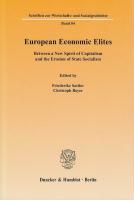Sattler Friederike Christoph Boyer (2 results)
Product Type
- All Product Types
- Books (2)
- Magazines & Periodicals
- Comics
- Sheet Music
- Art, Prints & Posters
- Photographs
- Maps
- Manuscripts & Paper Collectibles
Condition
Binding
- All Bindings
- Hardcover
- Softcover (2)
Collectible Attributes
- First Edition
- Signed
- Dust Jacket
- Seller-Supplied Images (2)
- Not Print on Demand (2)
Free Shipping
- Free US Shipping
Seller Location
Seller Rating
-
European Economic Elites.: Between a New Spirit of Capitalism and the Erosion of State Socialism. Schriften zur Wirtschafts- und Sozialgeschichte, Band 84.
Published by Duncker & Humblot 25.11.2009., 2009
ISBN 10: 3428131819ISBN 13: 9783428131815
Seller: Fundus-Online GbR Borkert Schwarz Zerfaß, Berlin, Germany
Book
Taschenbuch. Condition: Sehr gut. 594 Seiten Mit Strich auf Fußschnitt als Mängelexemplar gekennzeichnet, jedoch textsauber und vollständig. Since the beginning of the 1970s, democratic capitalist Western Europe as well as state-socialist Eastern Europe faced the double challenge of the third industrial revolution and the second globalization. The accelerated political, social, economic and cultural change did not lead to a crisis "of capitalism" or "of communism", instead challenging European industrial society as such. In 1989, after a long erosion process, state socialism failed at the task of solving the manifold problems of adjustment; yet a lasting solution is also not conceivable within the context of a neo-liberal "new spirit of capitalism". The present volume, which arose from the interdisciplinary cooperation of historians and social scientists, discusses the consequences of this "great transformation" for the economic elites in both "West" and "East": for their qualification profiles and their social composition, their options and their room for maneuver, their value systems and legitimization strategies, their self-perception and their public image. Economic elites in both systems saw themselves forced to adopt new strategies which very often seem quite different at the surface; looking deeper, they exhibit clear similarities. After 1989, the consolidation of the post-socialist economic elites has, all in all, been completed according to the Western example. The emerging convergences, which are being supported by the process of European integration, contributed to the internationalization of the European economic elites. The volume discusses the problem how strong this tendency was and if it has already created truly transnational economic elites more or less separated from the national context. The contributions, which are embedded into a coherent interpretative framework, are penned by internationally renowned experts and junior researchers from a wide array of countries, from Britain to Poland and from Norway to Portugal. The innovative value of the volume lies in its Europe-wide scope and, above all, in its comparative East-West perspective. A genuinely European community of researchers tackles a topic which is indisputably current for history as well as for the social sciences. Inhalt: In Lieu of an Introduction: Big Structures, Large Processes and Huge Comparisons - A Frame of Interpretation: F. Sattler / C. Boyer, European Economic Elites between a New Spirit of Capitalism and the Erosion of State Socialism - Economic Elites in the Twentieth Century: Overviews from Western and Eastern Perspectives: D. Ziegler, Economic Elites in the Twentieth Century: Germany and its Western Neighbours - Á. Pogány, Hungarian Economic Elites in the Twentieth Century - Formations and Profiles in Western Europe: Between Cohesion and Fragmentation: H. Joly, Die bemerkenswerte Persistenz der staatlichen grands corps bei der Rekrutierung der Wirtschaftseliten in Frankreich - F. Lavista, Business Elites in Italy and the Failure of the National Planning Policies as a Vision of Development - M. Loff, Elites and Economic Modernization in Portugal (1945-1995): Authoritarianism, Revolution and Liberalism - T. David / S. Ginalski / F. Rebmann / G. Schnyder, The Swiss Business Elite between 1980-2000: Declining Cohesion, Changing Educational Profile and Growing Internationalization - Formations and Profiles in Eastern Europe: Between Erosion and Transformation: Z. Varga, The Agrarian Elite in Hungary before and after the Political Transition - G. Lengyel, Social Factors Conditioning the Recruitment of the Hungarian Economic Elite at the End of the 1990s - M. Boldorf, Elitentausch? Die betrieblichen Führungskräfte in Ostdeutschland seit den 1980er Jahren - L. Macáková / E. Kubu, Transformation of Economic Elites after the Fall of Communism in Czechoslovakia - Challenges and Responses: Strategies during the Third Industrial Revolution: M. Schramm, Wirtschaftseliten und Wissenstransfer in der DDR und Bundesrepublik Deutschland 1949-1990: Beispiele aus den "wissensbasierten" Industrien - K. C. Priemel, Dispiriting Decade. Structural Crisis, Managerial Failure, and the Fall of the House of Flick, 1975-1985 - C. Dirninger, Der politische Unternehmer. Ein österreichisches Beispiel - T. Gulbrandsen, Private Business Lobbying in a Corporatist Society. The Case of Norway - Change of Values, Interpretations and Legitimations: P. Hübner, "Sozialistische Manager" und betriebliche Sozialpolitik in der DDR und Polen. Anmerkungen zu einem Vergleich - K. Golata, The Problems of a Business Elites' Image and Reputation. The Example of Poland - A. Vonderau, Enterprising self. Neue soziale Differenzierung und kulturelle Selbstdeutungen der Wirtschaftselite in Litauen - On the Way towards a Transnational Business Elite?: M. Leimgruber, Bringing Private Insurance Back In. The Geneva Association as a Transnational Insurance Think Tank (1973-2000s) - L. Sklair, The Transnational Capitalist Class. Theory and Empirical Research ISBN 9783428131815 Sprache: Englisch Gewicht in Gramm: 770.
-
European Economic Elites
Published by Duncker & Humblot, 2009
ISBN 10: 3428131819ISBN 13: 9783428131815
Seller: moluna, Greven, Germany
Book
Kartoniert / Broschiert. Condition: New. Since the beginning of the 1970s, democratic capitalist Western Europe as well as state-socialist Eastern Europe faced the double challenge of the third industrial revolution and the second globalization. The accelerated political, social, economic and cult.



